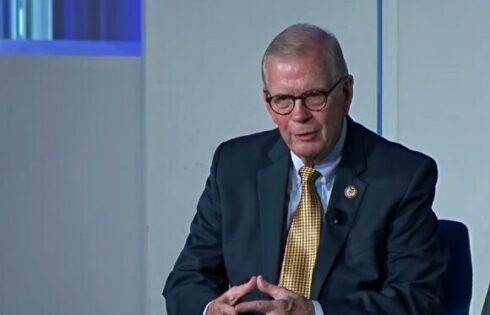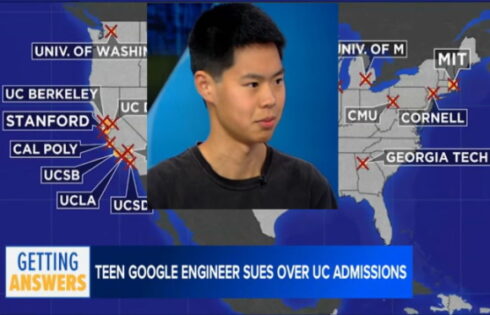
Fresh off recent victory, Speech First files another lawsuit
The pro-free speech nonprofit Speech First earlier this month filed a federal lawsuit against Iowa State University, accusing it of suppressing its students’ First Amendment rights.
Among practices cited as unconstitutional by Speech First were Iowa State’s ban on “chalking,” or drawing political messages in chalk on sidewalks, and the school’s invasive “Campus Climate Reporting System” team, which penalizes what the group calls “protected expression.”
The lawsuit was the fourth filed by Speech First over the last two years, the first three having targeted the University of Michigan, University of Texas at Austin, and University of Illinois. In each case, the group argued the respective schools’ “bias response” team unconstitutionally limits free speech on campus.
In a telephone interview with The College Fix this week, Speech First president and founder Nicole Neily said the lawsuits will hopefully serve as a deterrent for other university officials who think of setting up “bias response” teams in the future.
“If they can’t get off scot-free just by changing the policies once they get sued, hopefully it will make them think twice about putting the policies into place to start with,” Neily said. “Which is what they should have been doing all along.”
Neily refers to the fact that the lawsuit against the University of Michigan ended in success last October after it agreed to disband its bias response team in a settlement.
Campus officials had first rewritten some of its bias response team definitions after the lawsuit was filed, prompting a trial court judge to rule the team was harmless.
But after an appeals court hearing went poorly for the University of Michigan, it agreed to disband the bias response team and replace it with a “Campus Climate Support” program that does not contact the subjects of complaints, only reporting parties.
Neily said Speech First will continue to monitor Michigan’s flagship public university to see if it is living up to the dictates of the settlement.
The active lawsuits by Speech First include the recently filed one against Iowa State.
“Iowa State University and its officials have created a series of rules and regulations that restrain, deter, suppress, and punish speech about the political and social issues of the day,” wrote Speech First in the group’s preliminary injunction filing with United States District Court for the Southern District of Iowa.
“And the University has done so despite Iowa’s central role as the ‘first in the nation’ to weigh in on presidential elections,” the complaint adds.
Speech First’s lawsuit has been assigned to Judge Stephanie Rose, who in 2019 granted a significant victory to a religious group on the campus at the University of Iowa that argued leaders of the organization, Business Leaders in Christ, could be made to follow the religious teachings of the group. This policy was challenged by a gay student who was told his views were incompatible with the group’s mission.
The College Fix provided Speech First documents obtained from Iowa State via an open records law request that served as the basis for a portion of their lawsuit against the school.
University of Texas at Austin
In December 2018, Speech First filed a preliminary injunction against the University of Texas at Austin’s bias response team, arguing the school’s rules against “incivility” and “rude” and “insensitive” comments were unconstitutional.
The following June, District Judge Lee Yeakel not only denied the injunction, but dismissed the entire lawsuit altogether – an outcome even Texas hadn’t sought.
Speech First has now appealed the dismissal to the 5th U.S. Circuit Court of Appeals, and was recently told a hearing will be held the first week of March.
Neily noted that because Judge Yeakel dismissed the case outright, rather than simply ruling on the injunction, the 5th Circuit will now be able to rule on the merits of the case, rather than simply on the procedure.
Since the dismissal in June, the University of Texas has upgraded its legal team, hiring Allyson Ho, the wife of 5th Circuit Judge James Ho, to serve as one of their attorneys. Neily said the addition of Allyson Ho to the legal team may disqualify Judge Ho, a Donald Trump appointee, from participating in the case.
Neily called the addition of Allyson Ho a “smart strategy but also a transparently craven strategy.”
University of Illinois
In May 2019, Speech First challenged four policies on the University of Illinois campus that they believed restricted speech, most notably the campus bias response team and a policy that prohibited political pamphleting for non-campus candidates. The group noted that Illinois’ bias response team included law enforcement officers, arguing that quite literally made it a “speech police.”
The group is currently finishing its final response for the 7th U.S. Circuit Court of Appeals after its request for a preliminary injunction was denied by a lower court in September. On Thursday, it was announced the hearing will take place on February 27.
Neily told The Fix that if any of these cases were to go to the Supreme Court, the focus likely wouldn’t be about campus speech writ large – it would be about something more technical like “mootness” or “standing.”
“But that’s still an important building block for these cases,” Neily said. “And it really does elevate the risk for some of these schools.”
MORE: Iowa State bans students from promoting political candidates. It just got sued.
Image: Shutterstock.com
Like The College Fix on Facebook / Follow us on Twitter






Please join the conversation about our stories on Facebook, Twitter, Instagram, Reddit, MeWe, Rumble, Gab, Minds and Gettr.